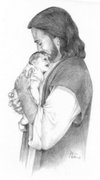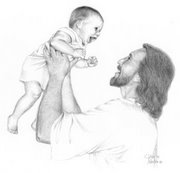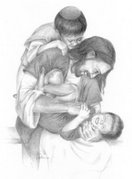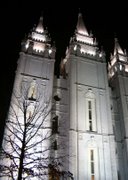When ordinary people catch a glimpse of eternity, it raises them to superhuman achievement.
Mine eyes have seen the glory of the coming of the Lord.
He is trampling out the vintage where the grapes of wrath are stored;
He hath loosed the fateful lightning of his terrible swift sword;
His truth is marching on.
(Julia Ward Howe, “Battle Hymn of the Republic”)
Have you heard the Mormon Tabernacle Choir sing “The Battle Hymn of the Republic”? I will never forget one time when I heard their rendition at the inauguration of a president of the United States. The choir was on the steps of the Capitol. That great beautiful dome glowed like a fine piece of china. It was a bright, clear morning. The flags were flowing. As the choir hit the final note, even the network newscasters were moved almost to speechlessness.
I think of Julia Ward Howe when she conceived that great hymn. She was looking out across a camp of Union soldiers. They were ordinary men, but they were caught up in a cause larger than themselves, a cause that transcended imperfect motives and worldly ambitions. For a moment she glimpsed the glory that could rise from the pain and heartache of that terrible war, and she expressed that glory in words. And her glimpse of glory inspired millions of people and gave them the little extra courage they needed to go on.
We all need courage to go on. Think for a moment what it was really like to be a pioneer. Think of the dispossessed Saints as they looked back across the frozen river at their nice warm homes in Nauvoo. Think what it might have been like for one of my great aunts who was five years of age when she walked from Winter Quarters to the Great Salt Lake Valley. Imagine what it was like to walk behind a wagon or in front of a handcart over the dusty trail. Imagine spending six months in the grime and the dust. Imagine the assignment of gathering buffalo chips for the fire. Think of how glorious that assignment must have been! Think of the mothers who gave birth on the plains. Think of the heartbreak of bearing a child and then having to lay that precious newborn in a shallow grave and cover it with rocks, praying that the wolves would not get to the little body.
What could possibly have motivated those people to go on under those conditions? They didn’t have to. They could have gone back. There were many people who made peace with the mobs and didn’t go west. What was it that motivated the faithful Saints to do what they did? I suggest that their eyes had seen the glory of the kingdom of God. When Brigham Young saw the Salt Lake Valley it wasn’t filled with the homes and churches and temples that he knew would one day be there. But he had glimpsed the glory, and he never doubted. And he was not alone. In their way, they all had seen the glory of the kingdom. That was what kept them walking across the plains. They had to have a glimpse of the glory, what we call vision or testimony.
Another example that means a great deal to me is that of my great-great-grandmother. She grew up m a pleasant section of England, a place of green, rolling hills. Her family was not wealthy, but they had a substantial living by the standards of their time. They left that condition to cross the ocean—not by Concorde, not by a slow, lumbering jet, not even by a fashionable ocean liner. With a company of Saints, they were able to hire a ship in Liverpool. The only vessel available was one that was supposed to have been scrapped. But they prevailed upon the owners to rent it to them for one last trip across the Atlantic. The owners thought, “Well, it has a reasonable chance of making the trip.” They found a captain and crew who were willing to sail this leaky old bucket.
When they had been at sea for about a week, a storm came up—a storm that, in the parlance of the sailors, put the ship “on beams end.” The beams are the timbers that go across the deck.
Now the captain didn’t want a bunch of panicky landlubbers interfering with his crew during storm conditions, so he simply closed the hatches to make sure the passengers stayed in the hold. So there was no way of escaping.
Down in the dark of the hold, the heavy trunks containing the Saints’ household goods broke loose from the ropes that secured them and slid from one side of the cabin to the other, so that the passengers were afraid to get out of their bunks for fear they’d have their legs crushed in the dark. They had brought their cooking equipment aboard, and all the pans and dishes were clattering from one side to the other, making almost as much noise as the small children screaming in terror in total darkness all night.
When the storm abated and the Saints were allowed up on deck, they immediately held services to thank the Lord for their deliverance. The old sea captain was impressed. After he had heard them sing their hymns and offer their prayers, he said, “You must worship a God who thinks a great deal of you, or you all would have been at the bottom of the sea this morning. The ship dipped water all night, and the sailors stood knee deep in water, pumping for their lives while the old ship went with the storm.”
Now they all knew ahead of time that they were taking that risk. Why did they do it? Why do people do things like that? I suggest that they had glimpsed the glory of the kingdom of God. I suspect there are a large number of people who do very heroic things because maybe just for a moment they glimpse the significance of an ideal.
I’d like you to think of another scene now. Think of the soldiers at Valley Forge, living under almost unbearable conditions with General Washington while he tried to get a ragtag army in condition to meet one of the greatest armies in the world. It is a tribute to the genius of the leaders that that army didn’t just dissolve into the woods and go home. Imagine yourself one of the soldiers at Valley Forge. Your feet are wrapped in burlap (the quartermaster doesn’t have any boots to issue you). You don’t have a gun (the quartermaster doesn’t have any guns to issue you). The tents are inadequate. There isn’t enough food. Dysentery is rampant. Imagine yourself in the cold, miserable wet of one of those tents, trying to cook a little decent food over a campfire (if you were lucky enough to catch a rabbit in the woods). Why did those people stay? I suggest that their eyes had seen the glory of freedom. Those men at Valley Forge had glimpsed the possibility of a glorious future, and that was what kept them there.
Most of our lives are burdened with the humdrum, the routine—doing the laundry, doing the dishes, going to school, commuting to an eight-to-five job, and all those boring, routine things that seem very drab and dull and wretched. But every now and then some people catch a glimpse of what they’re really doing, and that raises them to absolutely superhuman achievement. These are the people we look back on in history with great admiration. Such people have made it possible for us to enjoy the blessings of the gospel under very favorable conditions. We should be eternally grateful to them for that.
I hope we can all say that in some sense we have glimpsed the glory. There are many different kinds of glory that we can glimpse, but all are a reflection of the glory of our Father in Heaven.
Sometimes we glimpse the glory through the achievements of God’s children. Whatever good thing is conceived and achieved by the mind and hand of man is a testimony to the mind and hand of our Creator. In my work with NASA (the National Aeronautics and Space Administration) I have glimpsed this kind of glory many times.
I had the opportunity to be in the photographic laboratory when the first photographs from the Apollo VIII mission, which was the first orbital mission we flew to the moon, were coming out of the developer and fixer. The picture that I call “the picture of the century” shows an earthrise coming up over the dark, barren lunar terrain. You’ve seen a hundred versions of that picture. Every crew that went up after Apollo VIII had to take their own version of the earthrise picture. To see that photograph while it was still dripping wet out of the solution gave me a thrill that’s hard to describe.
The first time I saw the Saturn V vehicle, it seemed unimpressive. It looked exactly like all the other boosters. All boosters look exactly three-quarters the height of your TV screen, don’t they? It was out on the beach all by itself. There was no way to judge its height. We had spent all day on Missile Row at Cape Canaveral, Florida, becoming aware of some of the other booster systems. The second day, on our tour of the cape, we went out on pad 39A where the Saturn V test vehicle was sitting. It was 3.7 miles away when we started from the firing room, and the closer we got the more impressed I became. When we got there it was like trying to view the Empire State Building from the sidewalk. It was just a great curved mass of aluminum above me. The best way to see it was to get into the umbilical tower, press the button for the 23rd floor, which is the boarding platform, go up and look down on that vehicle, and then contemplate that someday you might be able to go into that white room and lie on that couch while someone back in the firing room pushes the famous button. It’s a very impressive sight. It gave me gooseflesh. Everybody likes to drive a souped-up car and have some real power in his hands. When you’re in control of the Saturn V, you’re burning fuel at the rate of 14.8 tons a second. The first stage holds 4.8 million pounds of propellant. You run out of that amount of fuel in two minutes and 31 seconds. The ten first-stage fuel lines going into those engines are the size of sewer pipes. With your hands on those controls, you have a certain sense of power.
Of course it’s good to keep man’s achievements in perspective. We have only to look up into the night sky to see how greatly our Father’s works surpass our own. In fact, I have often glimpsed the glory through the beauties of the world our Heavenly Father created for us.
I do a lot of flying getting to and from training meetings and planning meetings and tests at the various contractors with NASA. To do that, I’m furnished with a T-38 by NASA, and I fly it as part of my training as an astronaut. I “drive to work” quite often at 45,000 feet, just barely under the speed of sound. At 45,000 feet there are no commercial airlines. There are no mountains. I like to read the Doctrine and Covenants while I’m flying. Occasionally the weather is clear, and then the view is fantastic. Up west of Albuquerque one day, I could look in one direction and see Baja California and far down into Mexico. In another direction I could see the whole Imperial Valley and the Coronado Islands off San Diego. I couldn’t quite see San Francisco. That was just over the edge of the Sierra Nevadas. I could see a great gash that we call the Grand Canyon cutting across the plains to the north. From my altitude it looked as if some child had taken a stick and run it through a sandpile.
Further up to the north I could see the Rocky Mountains, almost to the Denver area. I could see about one-sixth of the United States in one great sweep, and that’s an impressive way to see a country. From that altitude you can see no litter on the side of the road. You can hear no family squabbles. You are unaware that there are divorces going on down there and lawsuits and discrimination and poverty. It’s a beautiful scene. You see the world as the Lord created it.
I was flying along the east coast of the United States one night at 45,000 feet. A large thunderstorm system had gone through and left the air absolutely clear. The whole coast looked like one great sheet of black velvet onto which someone had thrown handfuls of diamonds.
Perhaps even more thrilling than the wonders of nature is the glory we glimpse in the lives of our Heavenly Father’s children. I was at the solemn assembly when President Lee was sustained as the new president of the Church. I had a spiritual manifestation that that man was a prophet, just as much as Abraham or Isaiah or Peter were. Those little glimpses can help you do a lot of home teaching and some of the other less spectacular jobs in the Church.
The Lincoln Memorial induces in me a tremendous spirit of reverence. To walk into that great marble monument and see that magnificent statue and read the words of the inaugural address inscribed on the wall is unforgettable.
There are also places in nature to which a greater than human glory clings, places where we truly feel we are on holy ground because of what happened or is to happen there.
I don’t know how many of you have been in the Sacred Grove. Most people who go there have a glimpse of the glory. You don’t see the light Joseph saw there, but you have a little bit of the spiritual infusion that he received there in such great abundance.
There are other places where I’ve felt that also. I used to go to NASA meetings in Binghamton, New York, where they build the simulators we fly, and I’d go down to a little abandoned town called Harmony, Pennsylvania. Nearby, the Susquehanna River flows through a relatively narrow section of the Susquehanna River Valley. There are stretches along through there where you can’t see a single house or railroad or telephone pole. There’s nothing that would suggest it is any different than when Joseph and Oliver saw it. You can walk out on the banks of that river and say, “I wonder in which of these pools John the Baptist instructed the brethren to baptize each other. I wonder on which of those little hills or in which grove Peter, James, and John appeared to these brethren to ordain them to the Melchizedek Priesthood.” You feel a little bit of that spirit.
I have also visited the valley of Adam-ondi-Ahman in western Missouri. I get the same glimpse of glory there that I do in the Sacred Grove. We’re told in prophecies that someday there’s going to be a very special meeting there. It will be presided over by Adam. He will ask for reports from all the dispensations. Then the Savior will appear, and Adam will turn over to him a kingdom for the millennium. But that will be a private meeting. Probably only a few select priesthood holders will know about it. But you sense the great impact of that area.
Not everybody glimpses the glory. Sometimes a lot of people just miss the point. Toward the end of the last century, a Reverend Wright was a leader in the community of Elkhart, Indiana. A man by the name of Professor Kelly visited him. Professor Kelly was a local teacher who was trying to raise money for research in technical matters, and he wanted Reverend Wright’s support. He said that if people concentrated their industrial and technical efforts, they could do unbelievable things to raise their standard of living. He outlined some of the things that he thought might be accomplished. He said that man could increase his life span. He could construct homes that provided unheard of comforts and conveniences. He might even fly like a bird someday.
Reverend Wright said, “That’s an impious thought! I’m not going to support this. Go home and pray for forgiveness. To suggest that man could fly like a bird is to defy the will of God!”
Reverend Wright had two sons—Wilbur and Orville.
Sometimes people don’t glimpse the glory. And sometimes they glimpse a counterfeit glory. They waste their lives searching for the seven cities of gold or the fountain of youth. They’re following an image. They search for fool’s gold rather than the real thing. They have missed the point.
Let’s hope that we can glimpse the true glory and catch the real spirit.
Your generation, and I hope my generation too, could live to see the second coming of the Savior. You may see times of trial that make crossing the plains or an ocean voyage across the North Atlantic look very mild. You will need to have glimpsed the glory to sustain you through such times. If you do that—if you have glimpsed the glory of the gospel, of the Second Coming, of the millennial reign, of the celestial kingdom—it can sustain you as you cross your plains and the dust rolls up in your face. You may have to bury your children on the plains or freeze your feet at Valley Forge or meet whatever your challenge is to be. You will have trials as every generation has had trials. You may have more trials than most generations. You need to glimpse the glory to sustain you through those times.
[photo] When men soar above mortal limitations, they look at life from an eternal perspective. They see themselves as God sees them. It’s like looking at the world from 45,000 feet. The trials and struggles on the surface disappear. (NASA photo.)
New Era, July 1983















1 comment:
such a nice word
Post a Comment